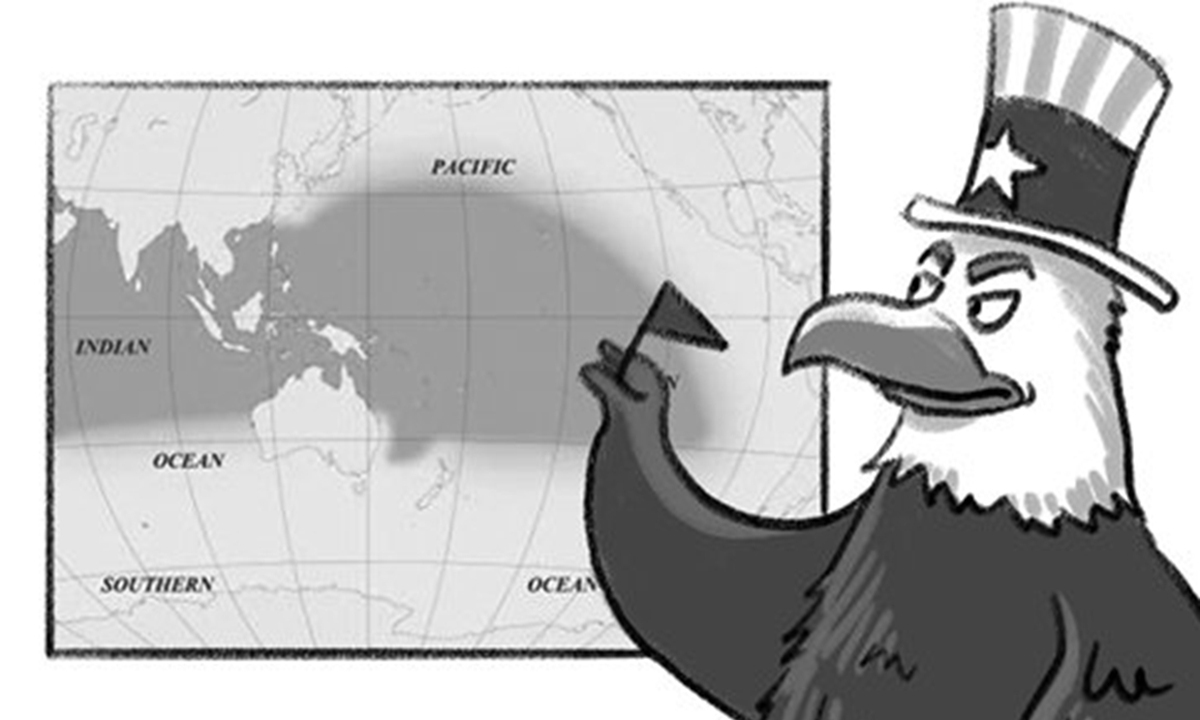Biden should revamp Asia-Pacific path, ditch Indo-Pacific idea: Global Times editorial
Source: Global Times Published: 2020/11/25 19:02:32

Illustration: Liu Rui/GT
Biden has picked his secretary of state and national security advisor as he begins assembling his administration team. The US new administration's diplomatic strategy is now in the spotlight. While Biden's team is highly focused on mending ties with European allies, Asia will certainly be a strategic priority.
So how will the new team play the "leadership role" that they have been anticipating? Will it continue Donald Trump's US-China confrontation? Or will it push for a broad participatory framework for managing differences? These are clearly two different paths.
There are two geographical concepts to describe Asia and the Pacific: "Asia-Pacific" and "Indo-Pacific." The term "Asia-Pacific" was widely used before the Trump administration. But after Trump took office, the use of "Indo-Pacific" replaced it. Both terms are currently imbued with political meanings, but there are subtle differences. The "Asia-Pacific" involves economic and cooperative connotations, while the term "Indo-Pacific" is directly associated with geopolitical competition and alliance confrontation.
The two concepts were both mentioned by different US administrations. The Obama administration coined the new term: rebalance to Asia-Pacific, a strategy that targets China, as he noted in his latest presidential memoir. The TPP that he initiated is also a key part of this strategy. However, the largest pillar of the idea of Asia-Pacific concept is still APEC, which holds annual summit and talks about cooperation. It largely balances US geopolitical maneuvers in the region. Therefore, people can feel more the constructive side about the "Asia-Pacific" concept.
By contrast, the term of "Indo-Pacific" has been very rudely transformed into a geopolitical concept by the Trump administration. Though the term is often put after an adjective of "free and open," it is mostly used for China-targeted issues. The backbone of the Indo-Pacific concept is the Quadrilateral Security Dialogue between the US, Japan, India and Australia. Whenever they hold meetings or conduct military exercises, all media reports relate the events to China. There is no economic cooperation organization corresponding to "Indo-Pacific," but only the military exercises and intelligence cooperation agreements that have played a role among the four countries. Taiwan authorities have repeatedly vowed to become part of the "Indo-Pacific strategy," showing naked antagonistic ambitions.
By forcibly replacing the term "Asia-Pacific" with the term "Indo-Pacific" over the past few years, Washington has sought to divide the region, promote an anti-China alliance, and create a geopolitical climate in which all countries in the region must take sides. Except for a few forces willing to follow the US in order to increase their regional presence, most countries are very resistant to the pressure to take sides. They do not want to see the situation in the region evolve like this.
Moreover, the "Indo-Pacific strategy" actually has not benefited the US. The vast majority of Asia-Pacific countries have no interest in becoming "Indo-Pacific countries." They perfunctorily respond to US' attempt to form cliques, and meanwhile try to get some benefits from the US in return. India is the US' main target to woo. But New Delhi's attitude toward China depends more on the situation of the two countries' border conflict - and not fudged US promises.
The Biden team should abandon Trump's reckless pursuit of the Indo-Pacific strategy, which runs counter to regional realities. They also should stop stirring up the region with the concept of the Indo-Pacific. After all, it lacks the support of economic cooperation and merely promotes confrontation. A binary system in the Asia-Pacific region between China and the US is certainly not welcome and will encounter opposition and barriers. That is not what the Washington elites want to see.
The Asia-Pacific region embodies cooperation and competition. Simply defining China as a rival and focusing attention on containing China will only cause long-term costs to the US itself.
Washington needs to engage in serious strategic communication with Beijing. The two need to explore and create an unprecedented win-win situation for both countries. Dialogues of this nature will produce far better long-term outcomes for both countries - unlike the current confrontation. It is a historic responsibility for the Biden administration to do this. By doing so, both China and US will reap rich rewards. So will the rest of humanity.
RELATED ARTICLES:
Posted in: EDITORIAL